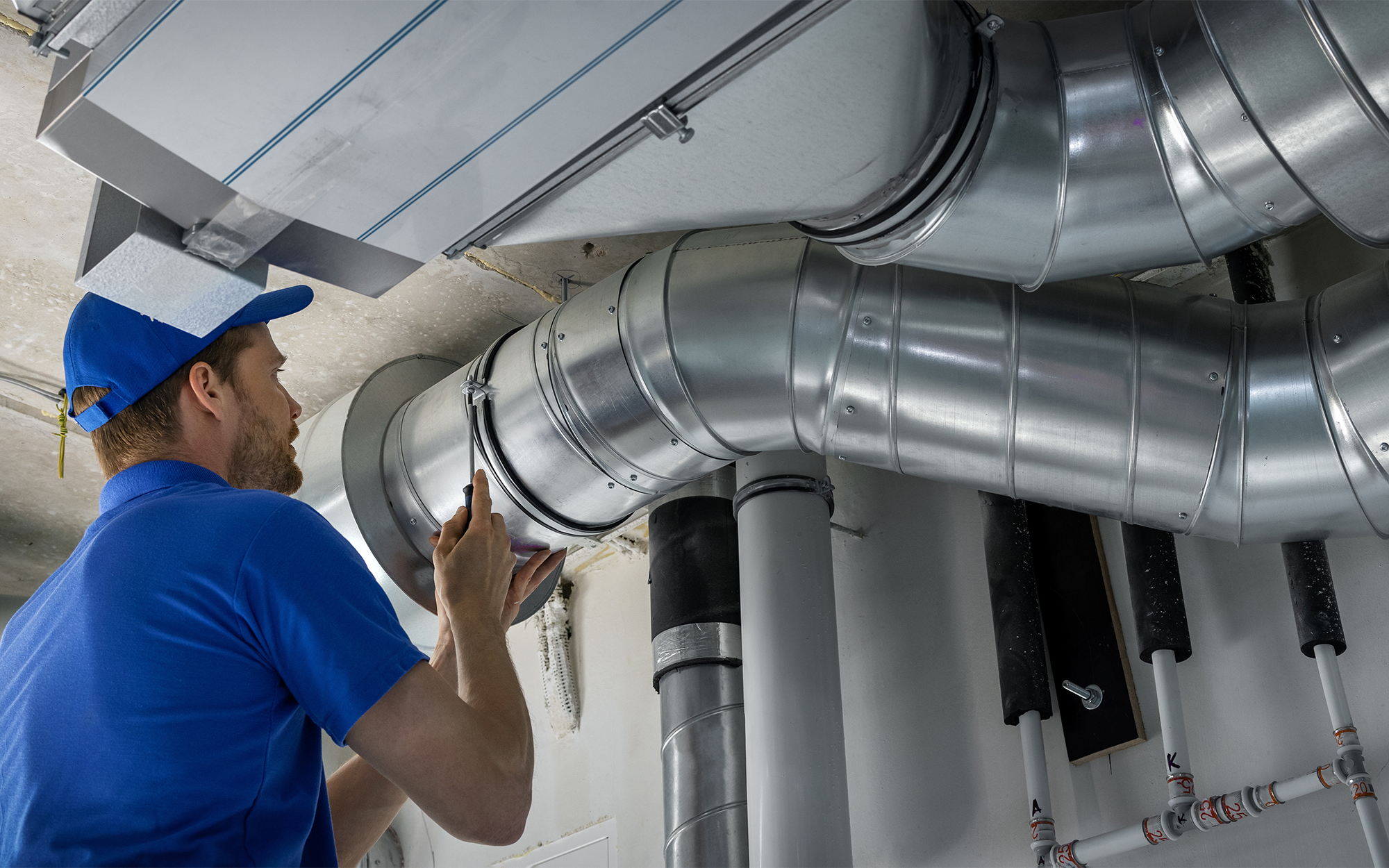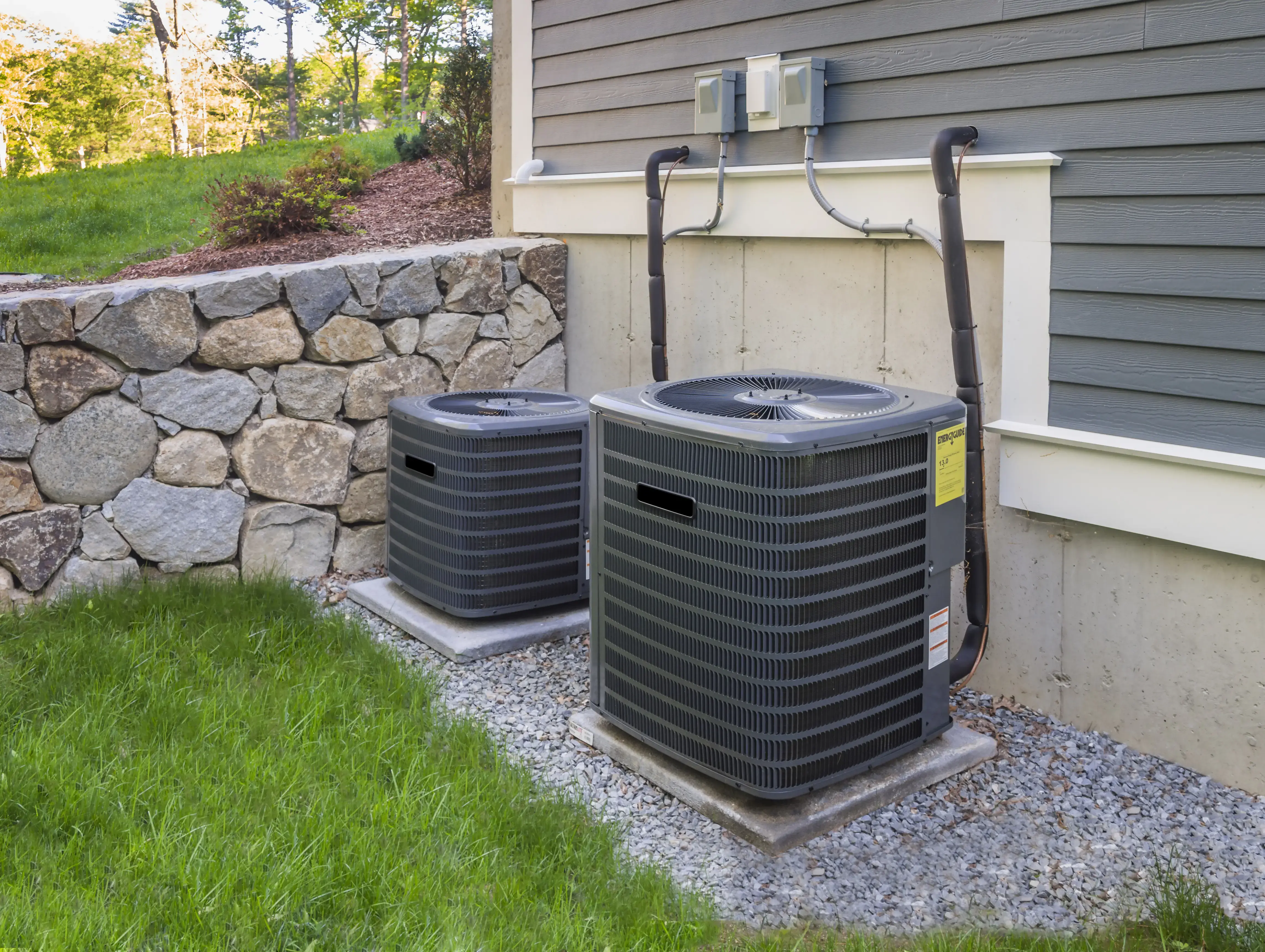Checking Out the Crucial Elements of an Effective HVAC System
An effective a/c system is developed on numerous vital parts that function in consistency. Each component, from the thermostat to the ductwork, plays a crucial function in preserving comfort and energy effectiveness. Comprehending these elements is important for enhancing performance and boosting interior air high quality. As one takes a look at these elements, the elaborate connections between them reveal insights right into boosting total system performance. What specific factors contribute most to this efficiency?
The Role of the Thermostat in A/c Effectiveness
Typically ignored, the thermostat plays an important duty in the efficiency of HVAC systems. This small device acts as the main nerve center, regulating temperature level settings and ensuring optimal comfort within a room. By precisely sensing the ambient temperature level, the thermostat interacts with the air, ventilation, and heating conditioning units to keep the preferred environment
An effective thermostat decreases energy usage by activating the cooling and heating system only when essential, thereby stopping too much heating or cooling. Modern smart and programmable thermostats enhance this effectiveness better by allowing individuals to set timetables and remotely adjust setups, adjusting to day-to-day routines.
The placement of the thermostat is necessary; improper place can lead to imprecise temperature readings, resulting in inefficient procedure. On the whole, a well-functioning thermostat not just boosts convenience yet likewise adds noticeably to power savings and the long life of the cooling and heating system.
Understanding the Significance of Air Filters
Air filters serve a vital function in heating and cooling systems by guaranteeing that the air circulating within a space continues to be healthy and clean. These filters catch dust, allergens, and various other contaminants, stopping them from being recirculated throughout the setting. By recording these fragments, air filters add to boosted indoor air quality, which can significantly benefit owners' health, especially those with allergic reactions or breathing problems.
In addition, maintaining clean air filters enhances the performance of a/c systems. Clogged filters can restrict air flow, creating the system to function more challenging to maintain desired temperature levels, bring about boosted energy intake and greater utility bills. Routinely changing or cleaning up filters is a vital upkeep step that can lengthen the lifespan of HVAC devices. Ultimately, understanding the significance of air filters enables house owners and structure managers to take proactive procedures to guarantee a well-functioning, effective HVAC system that promotes a comfy and safe interior environment.

The Functionality of the Heater and Heatpump
Furnaces and warmth pumps are important components of a/c systems, responsible for supplying warmth during cooler months. Furnaces run by home heating air through combustion or electrical resistance, then dispersing it throughout the home via air ducts. They typically use rapid heating and can be sustained by natural gas, electricity, or oil, depending on the system kind.
Alternatively, heatpump transfer warm instead of produce it. They extract warmth from the outside air or ground, also in low temperature levels, and move it indoors. HVAC experts. This double capability permits heatpump to also supply cooling in warmer months, making them versatile alternatives for year-round climate control
Both systems require proper maintenance to ensure effectiveness and long life. While heaters succeed in severe cool, heatpump can be useful in modest environments. Recognizing their distinct functionalities aids house owners in picking one of the most ideal alternative for their home heating requires.
Discovering the Air Conditioning Unit
The air conditioning system is a vital element of cooling and heating systems, offered in different kinds to match different requirements. Recognizing the performance rankings of these units is important for making informed options concerning power usage and cost. This section will certainly discover the varied kinds of air conditioners and make clear exactly how effectiveness scores impact performance.
Kinds of Air Conditioners
While different factors affect the selection of a/c systems, understanding the various types available is crucial for home owners and structure managers reference alike. Central air conditioning conditioners are developed to cool down whole homes or structures, using a network of ducts for see post airflow. Window devices use an even more localized solution, perfect for tiny areas or single areas. Mobile air conditioning unit supply flexibility, permitting individuals to relocate the system as needed. Ductless mini-split systems are an additional option, incorporating the efficiency of main systems with the benefit of zoning, as they call for no ductwork. Ultimately, geothermal systems harness the earth's temperature for energy-efficient air conditioning. Each kind includes distinctive benefits, making informed selections necessary for effective environment control.

Effectiveness Ratings Explained
Recognizing efficiency ratings is vital for picking the ideal air conditioning system, as these metrics provide insight right into the system's performance and power consumption. One of the most common ranking for a/c is the Seasonal Energy Effectiveness Proportion (SEER), which measures the cooling output throughout a regular cooling season separated by the complete electric power input. A greater SEER shows better effectiveness. In addition, the Power Efficiency Ratio (EER) is link utilized for determining performance under specific conditions. Another crucial metric is the Energy Star qualification, which represents that a device satisfies rigorous power performance guidelines. By reviewing these ratings, consumers can make educated options that not just maximize convenience but also minimize power costs and ecological effect.
The Relevance of Ductwork and Air movement
Reliable ductwork design and airflow management play important functions in the general effectiveness and efficiency of HVAC systems. Appropriate ductwork warranties that conditioned air is distributed equally throughout a space, minimizing temperature level variations and boosting convenience. Properly designed ducts reduce resistance to air movement, reducing the work on cooling and heating devices and eventually lowering power intake.
Air flow administration involves purposefully positioning vents and signs up to enhance the circulation of air. This stops typical issues such as cold or warm areas, which can occur when air movement is blocked or inadequately well balanced. Furthermore, the right air duct products and insulation can even more improve performance by minimizing heat loss or gain throughout air transit.
An efficient ductwork system not just adds to energy savings but can additionally lengthen the life expectancy of a/c devices by reducing unneeded stress (HVAC experts). Recognizing the significance of ductwork and airflow is necessary for achieving peak A/c system efficiency.
Normal Maintenance Practices to Enhance Efficiency
Routine maintenance practices are important for guaranteeing peak performance of HVAC systems. These techniques include routine examinations, cleaning, and required repair services to keep the system running successfully. Frequently changing air filters is vital, as clogged up filters can block air flow and decrease performance. In addition, technicians must inspect and tidy evaporator and condenser coils to protect against getting too hot and energy wastage.
Annual professional examinations are also recommended, as skilled professionals can determine possible concerns before they intensify. Lubing moving parts reduces deterioration, contributing to a much longer lifespan for the system. Guaranteeing that the thermostat functions appropriately help in keeping perfect temperature level control.
Regularly Asked Questions
How Often Should I Change My Thermostat?
Thermostats ought to usually be replaced every 5 to ten years, depending upon usage and technology innovations. Regular checks are a good idea to ensure peak efficiency, specifically if experiencing inconsistent temperature level control or increased energy expenses.
What Dimension Air Filter Is Ideal for My A/c System?
The very best size air filter for a cooling and heating system differs by unit design. Commonly, it's important to speak with the proprietor's manual or inspect the existing filter dimensions to guarantee peak performance and air quality.
Can I Set Up a Warm Pump Myself?
Mounting a heat pump individually is possible for competent people, however it calls for expertise of electrical systems and neighborhood codes. Employing a professional is suggested to ensure appropriate setup and optimal system efficiency.
Exactly how Do I Know if My Ductwork Is Effective?
To identify ductwork performance, one ought to examine for leaks, measure air flow at vents, examine insulation top quality, and evaluate temperature distinctions in between supply and return ducts. Expert evaluations can give comprehensive understandings into general efficiency.
What Are Signs My Cooling And Heating Demands Immediate Upkeep?
Signs that a heating and cooling system requires prompt upkeep consist of uncommon noises, irregular temperatures, enhanced power bills, unpleasant smells, and constant biking. Dealing with these problems quickly can stop more damages and guarantee optimal system performance.
Air filters offer a vital feature in Cooling and heating systems by ensuring that the air circulating within a space remains clean and healthy and balanced. Furthermore, preserving clean air filters enhances the efficiency of HVAC systems. Ductless mini-split systems are an additional choice, combining the effectiveness of main systems with the comfort of zoning, as they call for no ductwork. Understanding effectiveness ratings is essential for selecting the appropriate air conditioning device, as these metrics supply insight into the system's efficiency and energy consumption. The finest size air filter for a HVAC system differs by device design.